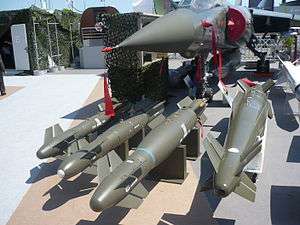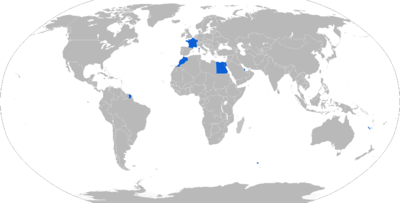Armement Air-Sol Modulaire
The Armement Air-Sol Modulaire[2][4] (Air-to-Ground Modular Weapon) (AASM) "Hammer" is a French Precision-Guided Munition developed by Safran Electronics & Defense. AASM comprises a frontal guidance kit and a rear-mounted range extension kit matched to a dumb bomb. The weapon is modular because it can integrate different types of guidance units and different types of bombs.
| Armement Air-Sol Modulaire (Air-to-Ground Modular Weapon) | |
|---|---|
 AASM family of weapons | |
| Type | Precision-Guided Munition |
| Place of origin | France |
| Service history | |
| In service | 2007 |
| Used by | French Air Force French Naval Aviation Royal Moroccan Air Force Egyptian Air Force Qatar Air Force Indian Air Force |
| Wars | War in Afghanistan ; 2011 Libyan civil war ; Northern Mali conflict ; Operation Inherent resolve |
| Production history | |
| Manufacturer | Safran Electronics & Defense |
| Unit cost | €164,000[1] (FY12) (~US$220,000) |
| Specifications (250 kg (550 lb) version) | |
| Mass | 340 kg (750 lb) |
| Length | 3.1 m (10 ft 2 in) |
| Warhead | 250 kg (550 lb) bomb body (Mk82, BLU 111 or CBEMS/BANG) |
| Engine | Solid rocket motor |
Operational range | 50 km (31 mi)-60 km (37 mi) at high altitude 15 km (9 mi) at low altitude[2][3] |
Guidance system | Hybrid inertial/GPS in decametric all-weather version Hybrid inertial/GPS + infrared homing or SALH in metric day/night version |
| Accuracy | 10 m (32 ft 10 in) CEP decametric version 1 m (3 ft 3 in) CEP metric version |
Launch platform | Mirage 2000D Rafale |
The basic version features a 250-kilogram (550 lb) bomb plus hybrid inertial navigation system (INS) / Global Positioning System (GPS) guidance. Other variants add infrared homing or laser guidance to increase accuracy; there are also versions with 125-kilogram (276 lb), 500-kilogram (1,100 lb) or 1,000-kilogram (2,200 lb) bomb bodies.
It entered service in 2007 with the French Air Force and Naval Aviation, from Rafale and Mirage 2000. In 2011, AASM was given the name HAMMER (Highly Agile Modular Munition Extended Range). Chosen for commercial reasons, the English acronym is also used in French. The French pronunciation of "AASM" was deux-A-S-M or A-deux-S-M.
Development
The program started in 1997, when the Délégation Générale pour l'Armement (DGA), the French defense procurement agency, launched an international competition on the design for the weapon. In 2000, a contract was awarded to SAGEM for an initial lot of AASM GPS/INS bomb kits, expected at the time to be delivered from 2004 and to enter service the following year.[5]
Validation
A test campaign to validate in flight the main performances of this AASM variant started on December 6, 2004 and ended on July 26, 2005.[6]
While demonstrating excellent results, this campaign showed the need to change some of the aerodynamic features of the weapon. To compensate for delays in AASM deliveries in 2008 France ordered dual-mode (laser- and GPS/INS-guided) GBU-49 Enhanced Paveway II kits for integration with Mirage 2000D and Rafale fighter-bombers.[7] The GPS/INS + IIR guided version completed its qualification tests on July 9, 2008 after three firings at the DGA's missile test range in Biscarosse.[8] This 250 kg IR version performed a night launch from a Rafale fighter-bomber at DGA's Biscarosse test range in December 2010.
According to Safran Electronics & Defense, the weapon was launched at a range of more than 50 km from the target, which was hit within one meter.[9] A 125 kg version was successfully test fired on January 27, 2009,[10] and a laser guided variant was air-launched for the first time on June 17, 2010.[11]
Cost
According to French Senate's Comité des Prix de Revient des fabrications d'Armement (CPRA) cited by the daily La Tribune, the total cost of the AASM program including development costs and the delivery of 2348 kits is €846m.[12] On that basis the per-weapon cost is $300,000 or twelve times the cost of the comparable American JDAM, although the latter has been manufactured in much larger quantities (~250,000 kits) and would be reasonable to expect a drastic reduction of the price of the French munition if larger contracts are signed and economies of scale are achieved.[13]
The 2012 defence budget presented to the Senate reported the project had cost €592.2m (~US$800m) with a unit cost of €164,000, or €252,000 including development costs.[1]
Variants
AASM comes in several variants according to its size and the type of guidance used.
- The current model features a 250 kg bomb matched to a nose-mounted guidance kit and a rear-mounted range extension kit, containing a rocket booster and enlarged fins. There is also a 125 kg, first tested in 2009, and a proposed 1000 kg version.
- As for guidance, the basic version combines data from a Global Positioning System (GPS) receiver and an inertial navigation system (INS) unit through Kalman filtering, achieving a 10 metres (32 ft 10 in) circular error probability (CEP). This "decametric" all-weather variant is complemented by a "metric" day/night fair weather version which adds infrared homing (IIR) guidance that matches the target area with a target model stored in its memory for a 1 metre (3 ft 3 in) CEP.
- A third version uses laser guidance instead of IIR allowing it to hit moving targets with more precision.[14] It was qualified in April 2013.[15]
On October 2010, these versions were given alphanumeric designations with the INS/GPS version becoming the SBU-38 (SBU=Smart Bomb Unit), the INS/GPS/IIR version becoming the SBU-54 and the INS/GPS/SALH version becoming the SBU-64; the system as a whole was renamed Hammer to make it more appealing to export customers.[16]
Operational use
The first order for AASM was placed by the DGA in 2000 for a total of 744 units; deliveries started in 2007 after a two-year delay in development.[17] In 2009 a second order for 680 units was placed, by the end of that year deliveries had reached 334.[18]
Afghanistan
AASM made its combat debut on April 20, 2008, during the War in Afghanistan when a Rafale fighter dropped two in support of ground troops.[19]
Libya
On 24 March 2011 it was reported that an AASM bomb dropped from a Dassault Rafale was used to destroy a Libyan Air Force G-2 Galeb light ground attack/trainer jet, the first Libyan warplane to challenge the no-fly zone during the 2011 Libyan civil war, on the runway just after the plane had landed at Misrata Airport.[20]
On 6 April 2011, it was reported that a AASM bomb dropped from a Dassault Rafale was used to destroy a Libyan tank at a range of 55 km.[21]
In Libya, 225 AASM bombs have been dropped [22]
"Also referred to as the Hammer, the AASM weapon has impressed during the campaign to date. Incorporating a precision guidance kit and propulsion system, the design will eventually be available for use with standard bombs weighing between 125kg and 1,000kg, although a 250kg version is the only one currently in service. Sagem cites a range capability of more than 32nm from high altitude, or 8nm from low level. Launches can also be made from an off-axis angle of up to 90°, while up to six weapons can be fired against individual targets in a single pass and with just one trigger press." And "Libya represents the first opportunity for the French air force to employ the Thales Damocles targeting pod, although the Navy gave the system its combat debut over Afghanistan in late 2010."[23]
India
Indian government is in talks with French government for emergency purchase of "hammer" missile, this is coming when indian Rafale is to be delivered by the end of July 2020 and India is in standoff condition with china. According to report published by leading asian news source ANI, french have agreed for the same and the deal is being processed.
Operators

See also
References
- "Projet de loi de finances pour 2013 : Défense : équipement des forces" (in French). Senate of France. 22 November 2012. Retrieved 2013-11-07.
- "AASM". Safran Electronics & Defense. November 25, 2014. Retrieved 5 August 2019.
- "Frances AASM Precision-Guided Bombs". Defense Industry Daily. Retrieved 5 August 2019.
- "Armement Air-Sol Modulaire (AASM) HAMMER Air-to-Ground Missile". Airforce-technology.com. Retrieved 5 August 2019.
- Nick Cook, "Europe sees technology as key: requirements in Europe are currently centred on the RAF's Precision Guided Bomb programme". Interavia Business & Technology. April, 2002. Retrieved July 15, 2010.
- Gilles Bessero, "Missile launching tests: main stakes for DGA/SPNuM". Ixarm Archived 2010-09-24 at the Wayback Machine. August 1, 2008. Retrieved July 15, 2010.
- "French Adding GPS to Paveway-II Bombs". Defense Industry Daily. February 14, 2008. Retrieved July 15, 2010.
- Sagem Défense Sécurité, Infrared terminal guidance version of AASM successfully completes final qualification firing test Archived November 12, 2008, at the Wayback Machine. July 16, 2008. Retrieved July 15, 2010.
- Philippe Wodka-Gallien (14 December 2010). "First night time launch of Sagem's AASM guided weapon with infrared terminal guidance". Sagem. Archived from the original on 15 July 2011. Retrieved 15 December 2010.
- Sagem Défense Sécurité, Successful first firing test of the Sagem AASM 125 air-to-ground weapon Archived April 30, 2009, at the Wayback Machine. February 12, 2009. Retrieved July 15, 2010.
- Sagem Défense Sécurité, First launch of Sagem AASM missile with terminal laser guidance a success Archived July 27, 2010, at the Wayback Machine. July 9, 2010. Retrieved July 15, 2010.
- (in French) Dominique Merchet, "Une bombe française à 360.000 euros pièce - Sagem conteste". Libération. August 27, 2010. Retrieved August 29, 2010.
- Magazine, Skies. "Rafale and F-35". Retrieved 5 August 2019.
- "France’s AASM Precision-Guided Bombs". Defense Industry Daily. July 14, 2010. Retrieved July 15, 2010.
- "France qualifies laser-guided bomb system". Upi.com. Retrieved 5 August 2019.
- Robert Wall, "Call it 'Hammer'". Ares. October 20, 2010. Retrieved October 21, 2010.
- (in French) Sénat of France, Projet de loi de finances pour 2008: Défense - Equipement des forces. November 22, 2007. Retrieved July 15, 2010.
- (in French) Sénat of France, Projet de loi de finances pour 2010: Défense - Equipement des forces. November 19, 2009. Retrieved July 15, 2010.
- Christina Mackenzie, "Rafale Fires First AASM". Ares. April 28, 2008. Retrieved July 17, 2010.
- "Libya live (16:22)". The Telegraph. 24 Mar 2011. Archived from the original on 22 March 2011. Retrieved 24 Mar 2011.
- "Mariane-Jean-Dominique Merchet (4 apr 2011)". The Mariane. 4 Apr 2011. Archived from the original on 16 April 2011. Retrieved 6 Apr 2011.
- October 12, 2011 France Spent Over 1,000 Bombs and Missiles in the 7 Month Libyan Campaign Archived 2011-10-13 at the Wayback Machine
- Flightglobal, June 14, 2011 France's Rafale fighter proves its 'omnirole' skills
- "Sagem wins export contract for AASM Hammer missiles on Egypt's Rafales". Sagem.com. 15 June 2015. Retrieved 5 August 2019.
- "Sagem AASM precision-guided air-to-ground munition goes laser". Dtchdefencepress.com. 8 May 2013. Retrieved 5 August 2019.
- "Air Recognition". Airrecognition.com. Retrieved 5 August 2019.
- "Sagem, OIS-AT To Co-Produce AASM Hammer In India". www.defenseworld.net. Retrieved 2019-11-18.